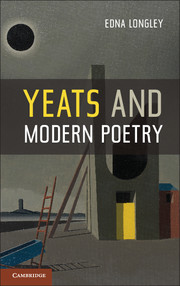Book contents
- Frontmatter
- Dedication
- Contents
- Preface
- Acknowledgements
- List of Abbreviations
- Chapter 1 Ireland as Audience: ‘To write for my own race’
- Chapter 2 Yeats and American Modernism
- Chapter 3 Intricate Trees: The Survival of Symbolism
- Chapter 4 ‘Monstrous familiar images’: Poetry and War, 1914–1923
- Chapter 5 Yeats’s Other Island
- Postscript
- Notes
- Index
Chapter 4 - ‘Monstrous familiar images’: Poetry and War, 1914–1923
Published online by Cambridge University Press: 05 June 2014
- Frontmatter
- Dedication
- Contents
- Preface
- Acknowledgements
- List of Abbreviations
- Chapter 1 Ireland as Audience: ‘To write for my own race’
- Chapter 2 Yeats and American Modernism
- Chapter 3 Intricate Trees: The Survival of Symbolism
- Chapter 4 ‘Monstrous familiar images’: Poetry and War, 1914–1923
- Chapter 5 Yeats’s Other Island
- Postscript
- Notes
- Index
Summary
Yeats’s omission of Wilfred Owen (1893–1918) from The Oxford Book of Modern Verse gave national as well as literary offence – perhaps deliberately. While expressing ‘distaste for certain poems written in the midst of the great war’, since ‘passive suffering is not a theme for poetry’ (OBMV xxxiv), Yeats justifies his contrary indulgence to Oliver St John Gogarty by boasting a superior Irish nexus between poetry and war. Gogarty’s ‘heroic song’ is an obvious mask for Yeats himself:
Twelve years ago Oliver Gogarty was captured by his enemies, imprisoned in a deserted house on the edge of the Liffey with every prospect of death. Pleading a natural necessity he got into the garden, plunged under a shower of revolver bullets and as he swam the ice-cold December stream promised it, should it land him in safety, two swans ... His poetry fits the incident, a gay, stoical – no, I will not withhold the word – heroic song.
(xv)Like ‘Lapis Lazuli’, although in less complex terms, Yeats’s introduction to the Oxford Book maintains that ‘tragedy is a joy to the man who dies’ (xxxiv). He did not omit Julian Grenfell’s ‘Into Battle’, a poem that celebrates ‘joy of battle’. But the Irish ‘incident’ harks back to the Civil War of 1922–23, which his sequence ‘Meditations in Time of Civil War’ (this chapter’s focal work) represents more bleakly. Yeats has not always found the ‘heroic’ unproblematic. Nor are he and Owen poetically so far apart; witness their similar roots in Romanticism and Symbolism, their intersecting influence on ‘public’ poetry of the 1930s (see Chapter 5). In ‘The Gyres’, Yeats may react to the reaction to Owen’s omission: ‘What matter though numb nightmare ride on top, / And blood and mire the sensitive body stain?’ (CW1 299). At least this improves on calling Owen’s poetry ‘all blood, dirt and sucked sugar-stick’ (L 874). As a defensive manoeuvre, the rhetorical question makes Yeatsian ‘nightmare’ ‘matter’ as little (or as much) as battlefield images.
But it’s not only Yeats who gives ‘war poetry’ a thematic stress that effaces ‘poetry’, and hence war’s impact on its aesthetics. As a basis for dissolving some categorical barriers between ‘war poetry’ and ‘modern poetry’, this chapter aligns poems by Yeats, which range across European and Irish conflicts, with poems more directly ‘of’ the Great War.
- Type
- Chapter
- Information
- Yeats and Modern Poetry , pp. 106 - 144Publisher: Cambridge University PressPrint publication year: 2013



